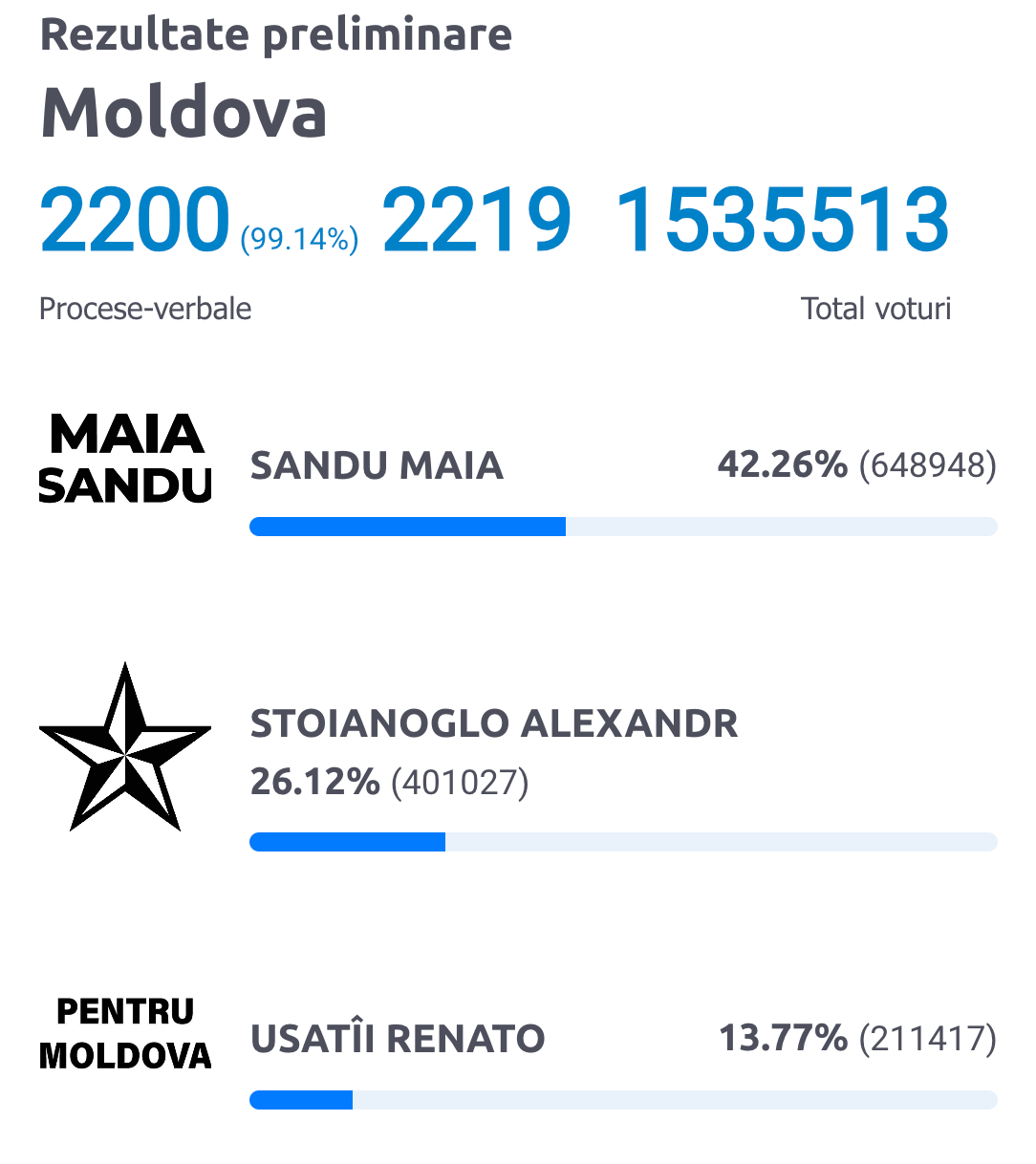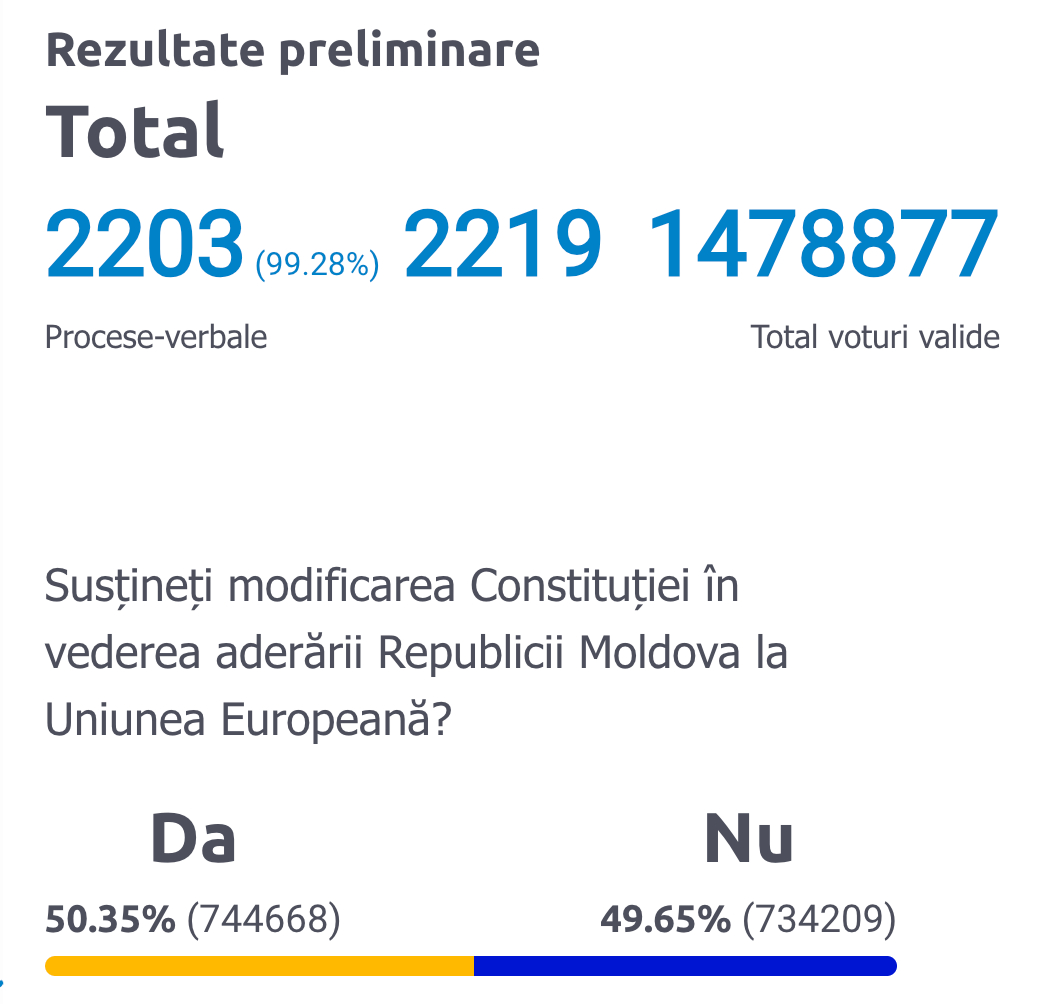The Preliminary Results of the Presidential Election and Referendum on EU Integration
With 99.14% of the vote counted President Sandu won a plurality of votes in the Presidential election with 42.26% trailed by Alexandr Stoianoglo with 26.12% and Renato Usatii with 13.77%.

Irina Vlah was 4th with 5.41% followed by Victoria Furtuna with 4.47%, Vasile Tarlev with 3.2% and Ion Chicu with 2.07%. No other contenders got more than 1% of the vote.
4 candidates, Andrei Nastase, Natalia Morari, Octavian Ticu and Tudor Ulianovschi got fewer than 15,000 votes - the minimum number of signatures they previously needed to present to the CEC supporting their candidacy.
The Referendum
The referendum for EU Integration has a preliminary result of 50.34% “Yes” and 49.66% “No.”

The only remaining votes to be counted are from the diaspora which voted heavily for EU Integration - by more than 77%. So it is now clear that the referendum will pass by an extremely narrow margin. Within Moldova only around 46% of voters supported the EU referendum with a majority of support only in Chisinau and 6 other regions.
Within the regions, it is notable that nearly 95% of voters in Gagauzia opposed the referendum. Where the referendum had over 50% of support this support was narrow - usually under 60%. But in the staunchest pro-Russian regions opposition to the referendum was nearly total.
One exception was Transnistria which voted 37% Yes and 63% No. At face value this seems notable, but turnout in the region was extremely low. Most voters needed to travel to the polls and possibly the few who did were not very representative of the region’s overall population.
These results represent a significant miss in the polls which predicted President Sandu getting nearly 50% support and potentially over 50% therefore preventing a runoff in 2 weeks. Pre-election polls predicted around 55% support for the referendum within Moldova.
Voter Turnout
One important factor in this election was turnout which was much higher than predicted. More than 1.5 million Moldovans voted representing an official turnout of 51.68%. As we’ve noted in the past, Moldova has very messy voter rolls and the total number of registrants is predicted to be far higher than the actual number of voters.
Whatever the metric turnout was high in all age groups and exceeded the vote totals for either the 2020 presidential election’s first round or the 2021 parliamentary elections. Turnout was slightly higher in the second round of 2020 (1.65 million).
Reactions to the Vote
President Sandu addressed the nation at 2 pm today. She stated:
"Thanks to you, dear Moldovans, we won the first battle. We won fair and square in an unfair fight. What happened in the last two years is an attack on our democracy (…) The enemies want Moldovans to doubt their unity. (…) We must learn from this miserable attack on democracy. We know we need to do more to fight corruption.”
“Now, the only way we can prevent a disaster is to vote. So that all efforts are not in vain, we have the duty to organize a general mobilization to vote. We have one more battle.”
She then appealed to the voters who supported Octavian Țîcu, Ion Chicu, Tudor Ulianovschi, Andrei Năstase and Renato Usatîi. She called on them to put aside their differences with her, to look beyond their disappointments and to “mobilize as many citizens as possible and prevent a disaster.”
The President also called on Alexandr Stoianoglo to join her in debates.
Answering questions from the BBC in English Maia Sandu was asked about the degree to which this was a protest vote against her vs Russian interference. The President stated that some voters simply do not understand what EU membership would mean to Moldova, but others took money for their votes. She further spoke about the dangers of “criminal groups” buying votes and called on democracies to work together to push back against this new form of manipulation. President Sandu stated that in the second round even greater mobilization and turnout will be required to overcome these challenges.
Throughout her statement and answers to questions the President thanked Moldovan voters for turning out in such huge numbers and for seeing through the disinformation to support a “Yes” vote in the referendum.
Previously there had been few public reactions and none today from the government or PAS. ZdG reports that all morning senior PAS figures were unreachable and had turned their phones off.
Last night President Sandu gave a late night press conference calling out foreign interference saying:
"Moldova faced an unprecedented attack on democracy today and in recent months. Criminal groups, together with foreign forces, hostile to our interests, have attacked our country with tens of millions of euros, lies and propaganda, with the most miserable means, to take us to an area of uncertainty and instability.
We have evidence and information that the target of the criminal group was to buy 300 thousand votes. The scale of the fraud is unprecedented. The aim was to compromise a democratic exercise. Their aim was to induce fear and panic in the society. We will not give up defending freedom and democracy.
We are waiting for the final results and we will come back with decisions",
It is unclear what “decisions” are or were being contemplated but at the time of the statement preliminary voter returns showed a majority of 55% “No” for the referendum. The vote only swung to over 50% “Yes” at around 8:30 this morning as diaspora votes trickled in.
President Sandu has scheduled a press conference for 2 PM today.
The Scale of Disinformation and Voter Bribery
At Moldova Matters we’ve written quite a lot in the past months about the unprecedented attack against Moldova’s electoral process by the Kremlin and their agent Ilan Shor. Much more will be written about it in the coming days and weeks as journalists around Moldova try and figure out what happened yesterday. At this stage it is clear that Shor’s voter bribery schemes had an effect. At the same time this cannot account for the whole picture.
It is likely that post election analysis will find that the disinformation from the Kremlin played a key role - probably more than direct bribery. For some voters, a wedge was successfully driven between wanting to join the EU and voting for the referendum. Arguments about a constitutional amendment resulting in a loss of sovereignty, or the referendum being an illegitimate tool to aid in Maia Sandu’s re-election campaign may have taken a stronger hold on some voters than polls could show.
At this point, there is only speculation. Unpacking the facts will take some time - time that Moldova doesn’t quite have.
Looking to the 2nd Round
On November 3rd Moldova will hold a runoff election between Maia Sandu and Alexandr Stoianoglo. Pre-election polls showing Sandu as comfortably close to 50% proved wrong and speculation has begun about how possible it will be for her to win a second round. The only 2 other candidates that ran an explicitly pro-EU campaign accumulated only around 1.5% of the vote combined. Should the pro-Russian and Shor linked candidates combine in support of Stoianoglo then he will become the favorite for the runoff.
It is also unlikely that the diaspora will be able to save her candidacy in the second round. Turnout in the diaspora was greater than 231,000 voters with 70% going to Maia Sandu. This is far higher than the 150,00 voters who turned out for the first round of the 2020 presidential elections but comparable in terms of support for the incumbent president (69% in 2020). In 2020 the second round turnout was higher than the first with more than 260,000 voters and they swung to Maia Sandu by nearly 93%.
Given the high turnout in the first round there simply aren’t enough extra votes in the diaspora to rely on. President Sandu will have 2 weeks of hard campaigning where she will need to convince many voters who voted against the EU referendum and for other candidates to support her over Alexandr Stoianoglo.
The biggest unknown right now is Renato Usatii. Mr. Usatii has always been a difficult politician to neatly categorize and is well known for switching sides. In 2016 he threw his support to Igor Dodon assisting in his victory against Maia Sandu. In 2020, where he also came 3rd, he threw support to Maia Sandu in the second round. It is possible that his supporters will be the decisive votes in round 2.
Taking Some Time to Process
Today does not feel good in Moldova for those of us who support European Integration and are appalled by Russian interference. People, including myself, are going to need to take some time to process what happened and how this election could have been so close.
Former Foreign Minister Nicu Popescu stated today that “Even a narrow win is still a win,” and went on to note that countries have joined, or left, the EU with very narrow margins before. He stated that “Tight majorities shaped the destiny of these nations” and congratulated Moldovan’s on a win under very difficult circumstances.
It is possible that this is how the history of this moment will be remembered. A close win, but a win. It is possible that a large number of “No” voters do support EU integration but found a technical reason to oppose the constitutional referendum. Right now, a lot of things are possible. Political spin will start up soon and the next phase of the election campaign will begin.
So before that all happens take a moment to process, go touch grass and take a deep breath because this race isn’t over yet.
We’ll be back throughout this week with updates as they come.




Good, measured and thoughtful piece. Moldova could do with more of that spirit.
A couple of gift articles: Looks like Central/Eastern NYT Bureau Chief Andrew Higgins has been in Chișinău covering the election. (Are you a source, David? Higgins is kind of a celebrity journalist to me.)
https://www.nytimes.com/2024/10/21/world/europe/moldova-eu-referendum-vote-result.html?unlocked_article_code=1.T04.0HHF.VKJu8CDYvzmC&smid=url-share
https://www.nytimes.com/2024/10/19/world/europe/natalia-morari-moldova-corrupt-business.html?unlocked_article_code=1.T04.MJre.4kUCwOTa1hur&smid=url-share